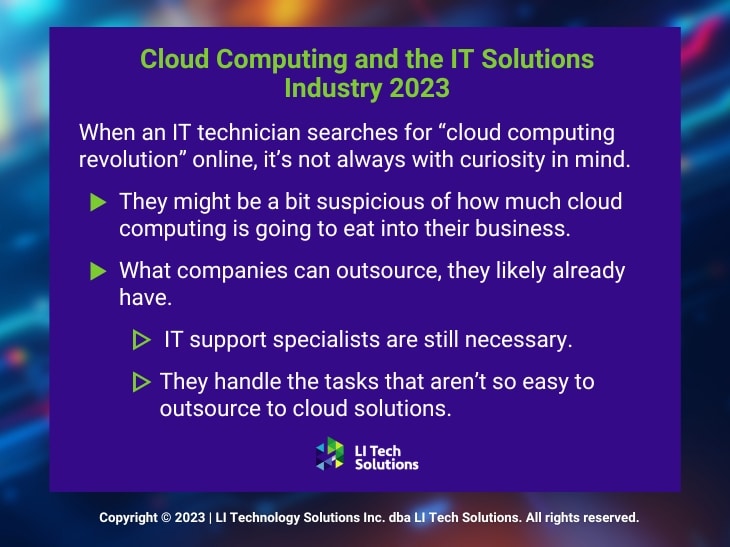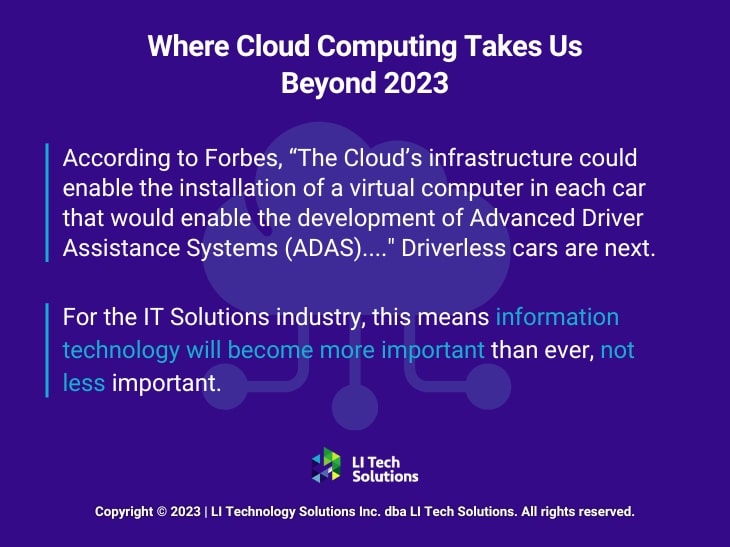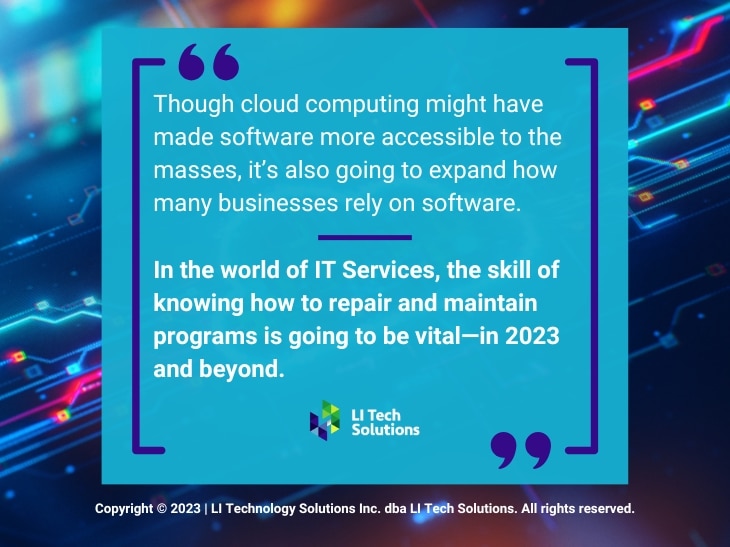The Internet has transformed the world in obvious ways. You only have to look at someone using their phone to see that. Eyes down, a quick giggle or two, then calling home and asking whether to pick up Chinese or Mexican food for dinner. Finally, using the same device to Google the local food pick-up spots. In a productive way, the Internet has made high-performance cyborgs of us all.
However, what you might not have noticed is the invisible revolution that has been taking place behind the screen: cloud computing. Imagine if you had sold steel during the railway boom of the 1800s. That’s what cloud computing is to the Internet: laying the groundwork that makes the digital world possible. The way we save our data and store our files affects everything around us. That may be why the global cloud computing market is expected to reach $1 trillion by 2028.
That’s still a long way off. What revolutions are happening in the meantime? Let’s look at how cloud computing figures into the IT solutions industry in 2023. Where is it going? What innovations will have the biggest impact? And how will cloud computing surprise and delight us in ways we never could have imagined before?

The State of Cloud Computing 2023
If the rail boom of the 1800s defined a century, then searching for “revolution of cloud computing” reveals something similar is happening right around us.
First, let’s get up to speed. We all know cloud computing has made saving files much easier. Save a file to the cloud, access it somewhere else, and voila—you never have to worry about data backup.
But for many of us, that’s where our knowledge ends. Let’s consider all the other ways cloud computing has had a bottom-line impact across every industry:
- Reducing costs. File storage and additional security can consume a significant amount of server resources. If you host your own servers, that provides some advantages, like control. However, it incurs high costs on the bottom line. Security, electricity, and storage can all quickly run up if you store all your information locally. And if you don’t need to hire an MSP or additional IT technicians and security personnel to oversee your file storage, that adds up to tremendous savings on payroll.
- Increased efficiency. There’s a reason it’s called “cloud” computing, after all. It seems like your important files are saved on some invisible “cloud.” That highlights the efficiency of cloud computing. You can outsource your file storage and security to a third-party location. This untangles your own systems, increasing your efficiency. Imagine, for example, that you didn’t need to use desks—you could just borrow a work surface whenever you needed it. That’s the kind of bottom-line efficiency you get out of cloud computing.
- Flexibility. Switch devices? Sure. Worry about backing up your own files? Yeah, if you want to. But cloud computing’s remote security has added flexibility to our lives. We trust third-party servers to store our information. This takes a load off our minds, freeing us to focus on productive work.
That brings us to our current situation. But no matter how many “cloud computing industrial revolution” articles you might read, it still leaves one question unanswered:
Where will cloud computing take the IT solutions industry?
Data Protection in the Cloud: Challenges and Best Practices 2024

Cloud Computing and the IT Solutions Industry | How It Affects Businesses in Long Island, NYC
IT Solutions and cloud computing can have a love-hate relationship. Of course, cloud computing is a boon to IT Solutions providers like MSPs. They often use it themselves for the reasons we just listed. But whenever an IT technician searches for “cloud computing revolution” online, it’s not always with curiosity in mind. They might be a bit suspicious about how much cloud computing will eat into their business.
We described it as a love-hate relationship for a reason. Let’s consider all of the factors at play in 2023:
What companies can outsource, they likely have already outsourced
After all, cloud computing is not a new concept. It has been a significant portion of Microsoft’s income for some time. Even just this past quarter, headlines read: “Microsoft Cloud strength drives second quarter results.” Microsoft’s customers have already moved much of their systems and files to cloud solutions.
That includes file storage, yes. But it also includes solutions like Salesforce. Entire online shops run on solutions like Shopify.
This has made the lives of IT technicians easier. After all, if there’s less IT for them to manage, then their lives are necessarily going to get easier. However, companies also utilize cloud computing to outsource some of their IT tasks. This means fewer IT technicians will be hired—there’s less to consider.
That isn’t the only challenge, however, because IT support specialists are still necessary. They may simply be necessary to handle the more difficult tasks—the ones that aren’t so easy to outsource to cloud solutions.
“Now that the simpler projects have been established on the cloud and the companies will be shifting,” writes Analytics Insight, “the more complex applications to the cloud in the hope of even better workplace efficiency.”
Trends and Predictions in IT Outsource Services for Microsoft AI
Cloud computing makes complex tasks simpler
When cloud-based solutions are available that cost only a fraction of the price of hiring a new team, most companies opt for the former. Why wouldn’t they? Even at large-scale enterprise costs, many software solutions cost a fraction of what it would take to build out new solutions with human capital.
This means more companies are utilizing sophisticated information technology. After all, the solutions are easier to use than ever. If the average entrepreneur can figure out a complicated CRM (customer relationship management) software offering, it makes previously complex tasks simpler. This provides more opportunities for businesses to scale. The simpler it is to onboard new employees and new systems, after all, the easier it is to replicate those systems as a company grows.

Where Cloud Computing Takes Us Beyond 2023 | Long Island Tech Explains
Where will cloud computing take us? It can take many different directions.
Forbes calls these “as yet undetermined opportunities.”
In NYC, for example, Forbes’ note on transportation is especially pertinent. “The Cloud’s infrastructure could enable the installation of a virtual computer in each car that would enable the development of Advanced Driver Assistance Systems (ADAS), where cars brake before they hit something,” writes Forbes. The minute ADAS becomes reliable enough to roll out safely, driverless cars are the next step.
Goodbye to Uber, taxi companies, and half the services in NYC and other metropolitan areas.
For the IT Solutions industry, this means information technology will become more important than ever, not less important. Yes, cloud computing could enable a veritable revolution in the way vehicles interact with the world. That’s bad news for taxi and truck drivers. But when a machine breaks down, it’s the IT professionals who have to step in.
This could also herald a revolution in e-commerce, as driverless trucks make it possible to host entire package-delivering fleets on the road without having to scale up the number of drivers hired. Delivery fees could plummet, further incentivizing customers to shop online. Once again, companies will be at the mercy of IT Solutions. They can’t afford to miss a delivery, after all.
The Future of IT Solutions: What to Expect in 2024 and Beyond

The Cloud Computing Revolution for IT Services and MSPs on Long Island, NYC
Though cloud computing might have made software more accessible to the masses, it’s also going to expand how many businesses rely on software. Many are viewing cloud computing as the fourth industrial revolution. At LI Tech Solutions, it’s our job to anticipate these changes—and make preparations for what that means for our clients. In the world of IT Services, the skill of knowing how to repair and maintain programs will be vital in 2023 and beyond.

